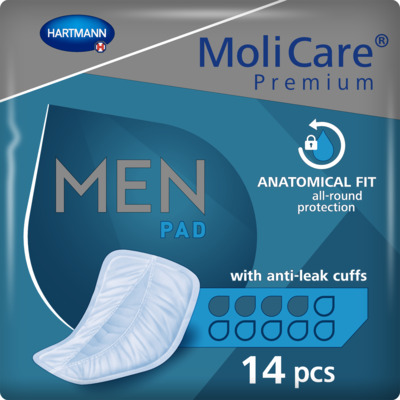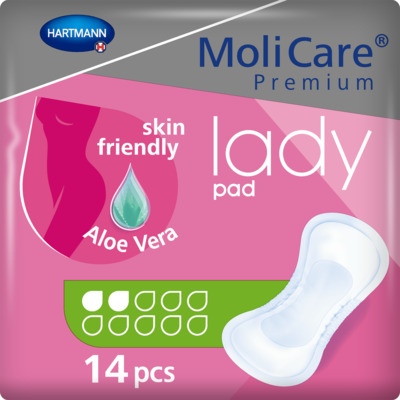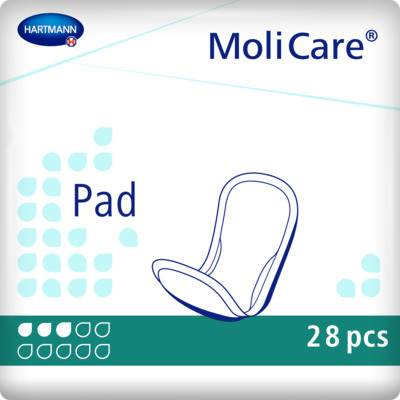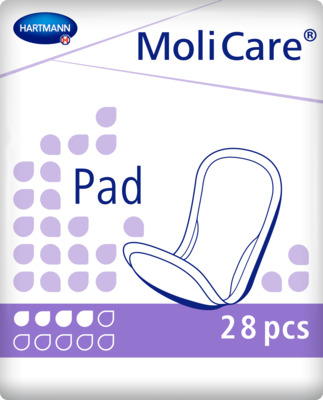Incontinence Advice
Nocturnal Enuresis - Causes Of Bedwetting In Adults
Nocturnal Enuresis is the medical term for bedwetting in adults. This guide explains more about the condition and if you are concerned about wetting the bed we can recommend wearing MoliCare incontinence pants or using MoliCare incontinence bed sheets during the night.

It is normal to wake during the night once or twice to go to the toilet. However, people who suffer with nocturnal enuresis won’t wake up and therefore empty their bladder (adult bedwetting). Nocturnal enuresis can be reduced with the right help. The urge to urinate during the night usually wakes up the sleeping person , but some adults don’t wake up and end up wetting the bed, this is called enuresis nocturna.
Nocturnal Enuresis - Causes of bedwetting in adults
What does nocturnal enuresis mean?
Nighttime incontinence, bedwetting in adults, bladder weakness at night – all terms used to describe nocturnal enuresis. Involuntary leakage of urine during the day – i.e. when awake – is called urinary incontinence. If this involuntary urination occurs during sleep – i.e. mostly at night – experts referred to it as enuresis or nocturnal enuresis.
Bedwetting does occur in children, adolescents; adult women and men have experienced uncontrolled emptying of the bladder during sleep. However, if a person is bedwetting this does not mean they are necessarily incontinent. Occasional, uncontrolled urination during sleep is not a cause for concern. From a medical point of view, enuresis is only diagnosed in people over the age of 5 if nocturnal enuresis occurs twice a month for at least a period of three months2,3 – or regular urine leakage during sleep.
Nocturia – constant urge to urinate at night is not urinary incontinence
There is no involuntary loss of urine, so nocturia is not a form of incontinence. Nocturia is the most common cause of sleep disturbances. As previously mentioned, to wake once or twice to pass urine is normal but anything more than this can become tiresome and annoying. If you have symptoms of nocturia, then it would be recommended you contact your GP.
What are the causes of adult enuresis?
Determining the exact causes of bedwetting in adults can be extremely difficult, as enuresis is an indication of an underlying medical condition. The reasons range from genetic predisposition to medical conditions. Psychology, stress, bladder irritants such as alcohol, caffeine and anxiety can also play an important role in adult bedwetting.
Possible causes:
Underlying conditions that can lead to enuresis include:
- Urinary stones
- Obstructive sleep apnoea
- Prostate enlargement
- Anatomical abnormalities
- Type I and type II diabetes
- Urinary tract infection (UTI)
Diagnosis and treatment of Adult enuresis
Your GP should be consulted if you experience any symptoms of adult enuresis so that the cause can be found and then a treatment plan can be put into place. The GP will investigate the causes, potentially using one or more of the following methods:
- Medical history: discuss the medical history of the person affected. Screening for possible psychological causes are also undertaken.
- Bladder diary: keeping a bladder diary. A bladder diary records what fluids you are drinking and how much fluid and when you go to the toilet. A bladder diary is really useful in identifying the bladders habits and patterns.
- Basic examinations include physical examinations, urine samples and ultrasound examination.
- Further examinations include urine flow measurement (uroflowmetry). This measures the amount of urine excreted per second. The amount of urine remaining in the bladder is subsequently checked (residual urine determination).

Depending on the findings, some of the following treatments may be offered by the GP:
- Bladder and toilet training in order to better control nocturnal enuresis (urotherapy).
- Pelvic floor training for strengthened pelvic floor muscles
- Electrostimulation and biofeedback
- Antibiotics if caused by UTI
- Fluid & diet advice such as reducing or cutting out caffeine and alcohol.
- Losing weight
- Medication
Products to manage the problem at night
MoliCare incontinence products should give you a peaceful and dry night’s sleep. It should be noted that there are several special features that an incontinence product that stores and contains fluids without feeling wet especially for the night:
Body position
During the day, we are mostly in an upright or sitting position, whereas in bed we sleep in a horizontal lying position. When lying down, the absorbent pad of the product is no longer supported by gravity, which makes it difficult to absorb urine when lying down. Therefore, incontinence products for the night should ensure that no urine leaks out at the sides. This is achieved by leakage protection and quick absorption. Ideally, the materials used should be made of soft materials; since those affected “are lying on the product” all night, rough materials can significantly affect comfort.
Supportive clothing
Our daytime outfit is not the same as our nightwear. When going out to work or shop for groceries we may wear several “layers” of clothing. Incontinence pads, for example, are often held in place by an adhesive strip in the underwear. An additional pair of trousers offers supportive hold with their thicker, firm fabric. This “scaffolding” is not given when wearing pyjamas or underwear. The product used should ensure that it does not slip when turning and moving during sleep. For when you need an extra layer of security for your pads or slips, our unisex MoliCare Premium Fixpantsare the ideal solution for a two-piece fixation system. Available in two convenient lengths – short and long – as well as a range of sizes, from small to XXXL, our lightweight and breathable fixpants are discreet and very comfortable to wear.
Wearing time
Another difference is the wearing time of the product. During the day, a person or carer can easily change the incontinence pad or incontinence pants; However, at nighttime, it is important that the persons sleep is uninterrupted and therefore the product should not require changing. The product should be able to withstand one – or at best several – urinations without leaking or causing a feeling of wetness.
Extra security at night is key to a good night’s sleep so when it comes to managing moderate to severe incontinence come bedtime, MoliCare range of incontinence bed pads are the ideal solution. Used on their own or together with your night-time pads or incontinence pants, our incontinence bed protection will help to keep you feeling dry, fresh and comfortable all night long.

The right incontinence product for the night
MoliCare® Premium Mobile 10 drops Day & Night Protection are a pull up style product with a soft textile, elasticated material that contours to your body-shape and can be worn like regular underwear. They provide full protection both in the day and at nighttime and still allow you to go to the toilet easily. Molicare Premium Mobile has a pH value of 5.5 and its advanced quick dry system with a triple-layer absorbent core ensures skin-friendliness. Up to 12 hours of leakage protection is secured based on high quality material and the two-part cuff system. Convenient removal by tear-open side seams.

For an additional layer of protection, you may also consider using bed pads for incontinence which are laid on the bed to protect any leakages from reaching the mattress, or molicare rectangular pads for extra coverage.
Those caring for a person who is incontinent should be aware that the skin can become irritated. To prevent the skin from becoming irritated, we recommend using a barrier cream daily. We have an article about "How To Maintain Good Hygiene For Someone You Care For" read it here >>
The various therapy methods and highly absorbent incontinence products help you and your loved ones to get dry again at night so that nothing stands in the way of a good night’s sleep.
Sources
- The standardisation of terminology in lower urinary tract function: report from the standardisation
sub-committee of the International Continence Society, Abrams et al., 2003:, page 39
https://www.goldjournal.net/article/S0090-4295(02)02243-4/fulltext - The wet child Becker T Journal of Urology and Urogynecology 2006; 13 (special issue 5) (issue
for Austria), page 7-10
https://www.kup.at/kup/pdf/6087.pdf - https://www.special-harninkontinenz.de/kinder/
- Continence, Incontinence, Continence Promotion, Practical Manual for Nurses, Hayder, Kuno, Müller,
Huber Publishing House, page 55 - J. P. Guignard et al: Endocrine theory of idiopathic nocturnal enuresis. In: Arch Pediatr. 1997, 4
Suppl 1, p. 3s-6s
https://pubmed.ncbi.nlm.nih.gov/9181001/ - https://www.netdoktor.de/symptome/enuresis/
- https://d-nb.info/977156338/34
- Paul A. Palmisano, MD, Enuresis: Causes, Cures and Cautions, West J Med. 1976 Nov; 125(5): 347-.
349.
https://www.ncbi.nlm.nih.gov/pmc/articles/PMC1237345/?page=2 - https://www.nafc.org/adult-bedwetting
- https://www.ncbi.nlm.nih.gov/pmc/articles/PMC4936340/

MoliCare® Premium Men Pad 4 Drops
<h2>Comfortable and absorbent</h2> <p>Why MoliCare for men? Hers are some of the key features of the MoliCare® Premium Men Pads from Hartmann:</p> <ul> <li>Discreet and comfortable</li> <li>Fits the male physique</li> <li>3-layer absorbent core</li> <li>Fast-absorbing system</li> <li>Anti-leakage cuffs</li> <li>Odour neutralisers</li> <li>Wide adhesive strip</li> <li>Skin-friendly</li> </ul> <p>With an affordable price and great quality guarantee, you cannot regret choosing MoliCare® Premium Men Pad 4 drops, equipped with anti-leak cuffs, and 14 pieces per bag.</p> <h2>Slim and discreet under clothing</h2> <p>MoliCare® Premium MEN Pads offer reliable support for men dealing with bladder weakness. Whether it's stress incontinence or urge incontinence, these pads for men are designed to provide a discreet and quick solution on the go. Simply place the pad before applying your underwear and secure it with the adhesive strip for worry-free protection. MoliCare® Premium MEN Pads offer full coverage for men facing very light to moderate bladder weakness.</p> <h2>Leakage protection for men</h2> <p>MoliCare® understands that each individual's incontinence needs are unique. That's why our incontinence products, including MoliCare® Premium MEN Pads, are available in different absorbency levels. You can find the perfect fit and protection for your specific requirements.</p> <h2>Reliable and soft on the skin</h2> <p>Our body-shaped absorbent pads are designed to deliver dependable and skin-friendly incontinence protection every day. Experience discreet comfort with the soft, cotton-like materials and the added benefit of an odour neutraliser, ensuring you feel fresh and confident throughout the day.</p> <h2>Fast delivery to your home</h2> <p>At HARTMANN Direct, we ensure a fast delivery service for all our products. Enjoy free delivery on orders over £50, making it convenient and hassle-free to receive the incontinence products you need. Our dedicated customer care team is here to discuss your incontinence product needs and answer any questions you may have. Call us today on 0800 028 9470 to experience the comfort and confidence that MoliCare® Premium MEN Pads can provide.</p>
MoliCare® Premium Lady Pad 2 Drops
<h2>Skin Friendly Pant Liners</h2> <p>For women that experience slight incontinence and bladder weakness, across different age groups, it can be a challenge to find the right bladder weakness product that is easy to apply and wear without the worry of potential leakages. Fortunately, we understand this approach, hence why we are happy to offer our MoliCare® Premium Lady Pad 2 drops, that is skin-friendly, Aloe Vera applied, and comes with 14 liners per bag.</p> <h2>Slim and discreet liners</h2> <p>Whether dealing with stress incontinence or urge incontinence, these panty liners offer a discreet and easy solution on the go. Simply place the pad in your underwear and secure it with the adhesive strip for all-round protection. Available in different absorbency levels, MoliCare® bladder weakness products cater to all levels of bladder weakness, ensuring secure care.</p> <h2>Control Bladder Weakness</h2> <p>Enjoy the benefits of these body-shaped absorbent panty liners, designed for women with bladder weakness. The pads offer discreet, reliable protection with features including odour control and fast absorption.</p> <p>With a wide adhesive strip, you can comfortably fix the pad in your regular underwear, providing secure and comfortable fixation. The pads are skin-friendly, featuring soft, breathable materials, including foam cuffs, and a top sheet treated with Aloe Vera.</p> <p>Keeping your skin healthy is a priority, which is why MoliCare® Premium Lady Pads have a skin-neutral pH value of 5.5 and an antibacterial finish. They are also dermatologically tested, offering peace of mind.</p> <h2>Buy pant liners online</h2> <p>Never worry about running out with our convenient order service and fast delivery direct to your door. Enjoy free shipping on orders over £50.</p> <p>If you need assistance, our professional customer service team is here to support you in choosing the right product. Reach out to us today at 0800 028 9470 and experience the comfort and reliability of MoliCare® Premium Lady Pads.</p>
MoliCare Pad 3 Drops
<h2>Incontinence pads for men and women</h2> <p>Protect yourself against slight bladder weakness with the MoliCare® Pad 3 drops. Suitable for men and women, offering an ideal solution to regain control and live your active life without interruptions. Slimline, discreet, and contoured to fit your body, these incontinence pads ensure a comfortable and barely noticeable feel, providing exceptional dryness and protection for slight incontinence.</p> <p>Crafted with soft, skin-friendly fabric and a polyester backsheet, these incontinence pads ensure you can confidently go about your day, secure against minor leaks. The wide adhesive fixing strip keeps the pad securely in place, while the super absorbent core wicks moisture away from your skin. The elastic anti-leak edging adds an extra layer of reassurance, and odour neutraliser keeps you feeling fresh and confident. With the MoliCare® Pad 3 drops, you no longer need to let slight or occasional incontinence hold you back from enjoying life to the fullest. Simply adhere the pad to your underwear, and you will barely feel the difference.</p> <h2>Price match promise</h2> <p>Experience convenience with our fast delivery service, bringing your chosen products directly to your door. At HARTMANN Direct, we offer a price match promise and free delivery for orders over £50, making sure you receive both quality and value.</p> <p>If you need further assistance, our customer care team is here to help. Give us a call today at 0800 028 9470, and we'll find the perfect incontinence product tailored to your needs. Take charge of your life with the reliable and comfortable protection of MoliCare® Pad 3 drops. Say goodbye to worries and hello to an active and confident lifestyle.</p>
